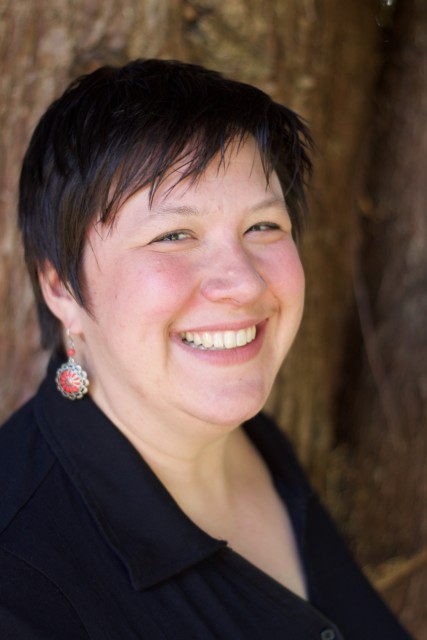We’ve had a maelstrom of disagreements within Mormonism over the last month. Name-calling, leave-taking, wall-building.
No matter where you stand on “the policy,” if you’re in any way serious about the gospel — if you’ve absorbed its message about every person being needed and valuable in the body of Christ — such anathematizing is going to hurt. Ought to hurt.
Guest blogger Jenny Webb writes today of still a better way, the way of charity — the way of learning to disagree in love.
I hope we are listening. — JKR
A guest post by Jenny Webb
Several weeks ago, I met with a dozen other women to discuss Steven Peck’s novella A Short Stay in Hell.
What followed was one of the more spirited and thought-provoking discussions that our little book club had seen for many months. People disagreed, passionately so, about nearly every aspect of the book: some loved it, some hated it; some found the ending hopeful, others found the ending depressing and bleak; some felt the author had captured something essentially Mormon in his depiction of a quantified eternity, and others were troubled that a practicing Mormon author would create a universe that explicitly stated that Mormonism was wrong and then thrust a good Mormon man into a seemingly endless Zoroastrian hell.
We talked for several hours before anyone even thought to break for refreshments, and we continued to converse in smaller groups over plates of frosted pumpkin bars late into the night.
It was, in many ways, for me a quintessentially Mormon gathering. What made it so Mormon wasn’t the book we read (we’re a “read a little bit of everything” kind of book club), but rather the energy with which people discussed and debated the evening’s chosen material.
Mormons read texts, and it’s my belief that we like to read texts that challenge us to think, to engage, and to question our own personal response and beliefs. We’re a people of the book (and books and more books!), and the point of scriptures is, ultimately, to provoke us to the type of questioning that will drive us to prayer and turn us toward God.
“We believe in all good. If you can find a truth in heaven, earth, or hell … we believe it; it is ours,” said Brigham Young. While I’m certain Young did not have Peck’s Hell in mind, the sentiment stands: a challenging book brought about a discussion that produced, in its charity, truth.
Charity is the key. I was impressed throughout the evening with the overriding civility and respect maintained by all. It would have only taken one person to roll her eyes and say, “She’s clearly an idiot for thinking X, Y, or Z” to have engendered some seriously hurt feelings—after all, these are women who worship together, volunteer together, and some are even family!
But no one wanted that. And as much as we might have disagreed with someone’s interpretation, no one found such differences of opinion worth severing a relationship.
And I love how I felt both intellectually and spiritually stimulated by the entire process: reading the book, gathering for discussion, and ultimately, exercising charity.
It’s a pattern that, for me, has proved repeatedly fruitful. For example, how did I navigate the completely mind-boggling process of becoming a mother (three weeks early!)? It helped immensely that I was reading like crazy for my MA exams—my newborn loved listening as I read Cervantes, Shakespeare, and even Euripides. And I felt myself finding a new rhythm between language and love.
I’m thinking of a recent Patheos post by LDS scholar George Handley, in which he says,
“The humanities are a wonderful training ground for charity. They teach us how to imagine communion. They are methods for experiencing reconciliation, for imagining beauty and meaning in the wake of chaos and suffering, and for connecting us to one another and to the cosmos. Reading great literature, learning languages, listening to music, watching live theater or great films, or participating in religious ritual—these are all experiences that are aimed at reinvigorating and expanding our sense of self and belonging in the world.”
The humanities—the arts as texts, whether they be literature, painting, music, dance, drama, and more—can be experienced in this sense as fundamentally religious. They serve as opportunities to experience truth and to form community, yes. But they do so not through consensus, but rather through charity.
And charity, in texts, emerges as a practice only through discussion and debate, criticism and revision, and, most of all, questioning and listening together.
If you are interested in discussions regarding the humanities with Mormons who work in the field, please consider joining the Mormon Scholars in the Humanities at their annual meeting, which will be hosted by Utah Valley University on April 8–9, 2016. The call for papers is available here. The conference is open to the public.
Jenny Webb lives in Huntsville, Alabama with her husband, Nick Webb, and two children. She has an MA in comparative literature from Brigham Young University and works as an editor and production manager for several academic journals. She has contributed chapters to Perspectives on Mormon Theology: Scriptural Theology; An Experiment on the Word: Reading Alma 32; and Reading Nephi Reading Isaiah: Reading 2 Nephi 26–27, which she co-edited along with Joseph M. Spencer. She is the current president of Mormon Scholars in the Humanities and serves on the Mormon Theology Seminar Executive Board.






